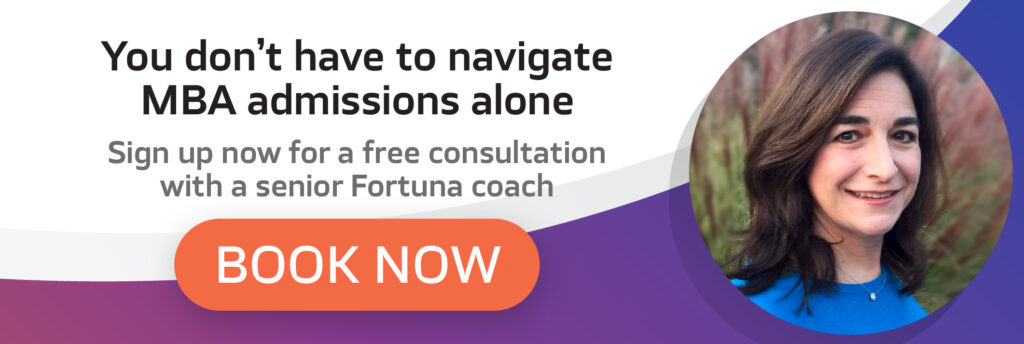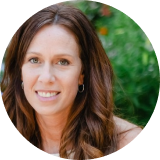Applying to Kellogg means showing up with intention. From its emphasis on values-driven leadership to its culture of collaboration and lifelong learning, Kellogg seeks applicants who are both self-aware and purpose-driven. The essays – and the short-answer and video components – are your opportunity to convey not just what you’ve done, but who you are, what motivates you, and how you’ll contribute to the Kellogg community. Essay 1 asks about your career goals, why now is the right time for an MBA, and why Kellogg is the best fit for your journey. Essay 2 focuses on a difficult professional decision and the leadership values that guided how you handled it.
To succeed, your application needs more than polished writing – you’ll need a cohesive, personal story that aligns your goals, values, and experiences with what Kellogg is all about. In this article I’ll unpack how to approach each element of the Kellogg MBA essays with clarity, strategy, and authenticity.
How To Answer Kellogg MBA Essay 1
Kellogg’s Essay 1 prompt is as follows:
Intentionality is a key aspect of what makes our graduates successful Kellogg leaders. Help us understand your journey by articulating your motivations for pursuing an MBA, the specific goals you aim to achieve, and why you believe now is the right moment. Moreover, share why you feel Kellogg is best suited to serve as a catalyst for your career aspirations and what you will contribute to our community of lifelong learners during your time here. (450 words)
This prompt is a thoughtful twist on the classic “Why an MBA? Why now? Why this school?” question. It invites you to reflect not just on your goals, but on the motivations and experiences that have shaped them. Kellogg is looking for evidence that you’ve made deliberate, well-considered choices – that you’re approaching this next step with clarity, purpose, and a strong sense of direction. It’s your chance to articulate the “whys” behind your goals – and show that your decision to pursue an MBA is part of a larger, intentional journey.
Reflect on the personal experiences, perspectives, and turning points that have shaped your path and led you to pursue an MBA at Kellogg. The Admissions Committee wants to see that your goals are rooted in real experience and thoughtful reflection.
For instance, don’t just say you want to become an investment banking associate focused on M&A. Explain what sparked that interest. Perhaps you worked at a startup that struggled to raise capital and was ultimately acquired under tough terms – a moment that inspired you to better understand the dynamics of strategic transactions and become part of that decision-making process.
The word “catalyst” offers a key insight into what Kellogg is looking for. The admissions committee wants to understand how Kellogg – its culture, community, and offerings – will accelerate your growth and help you achieve your goals. This is where school fit matters. Do your research, but go beyond listing classes or clubs pulled from the website. Admissions officers have read thousands of essays filled with generic name-dropping. Instead, show that you’ve thought deeply about how specific aspects of Kellogg will shape your journey – and why they matter to you. Make sure you meaningfully connect Kellogg’s offerings to your personal journey and future vision.
Finally, this question invites you to reflect on how you’ll contribute to Kellogg’s community. This is your chance to showcase the unique perspectives, passions, or experiences you’ll bring to the table. Think beyond academics: How will you engage with your peers, enrich the Kellogg experience, and leave a lasting impact both during the program and after you graduate? Whether through a club, initiative, or informal mentorship, be specific about how you’ll show up – and why it matters to you.
A common missed opportunity in this essay is focusing only on what you’ll contribute during the MBA. Kellogg is explicit in its reference to a “community of lifelong learners” – so think beyond the two years in Evanston. Will you stay engaged with Kellogg’s alumni network in your city? Could you contribute to industry events or serve as a mentor through a student club or admissions initiative? If the Career Center hosts alumni panels in your target field, could you see yourself returning as a speaker? This is also a great place to demonstrate intellectual curiosity and a commitment to continued growth. How will you keep learning, evolving, and giving back – long after graduation?
Key Takeaways for Kellogg MBA Essay 1
- Be intentional and reflective. Kellogg is looking for clarity of purpose – not just what you want to do, but why it matters to you. Ground your goals in past experiences and personal insight.
- Go beyond surface-level school research. Don’t just list classes or clubs – show how specific aspects of Kellogg’s community, culture, and resources will meaningfully support your growth.
- Show up as a contributor. Use this essay to highlight the unique energy, perspective, or passion you’ll bring – inside and outside the classroom – during your MBA experience.
- Think long-term. Kellogg values lifelong learners. Demonstrate how you’ll stay engaged with the community post-graduation and continue to contribute and grow as an alum.

How to Answer Kellogg MBA Essay 2 on Leadership?
Kellogg’s Essay 2 prompt is as follows:
Kellogg leaders are primed to tackle challenges everywhere, from the boardroom to their neighborhoods. Describe a specific professional experience where you had to make a difficult decision. Reflecting on this experience, identify the values that guided your decision-making process and how it impacted your leadership style. (450 words)
This essay gives the Kellogg admissions committee insight into how you lead under pressure – not just what you did, but what guided your thinking, and how the experience shaped your leadership approach. The mention of challenges “from the boardroom to their neighborhoods” reflects a core Kellogg belief: leadership is a mindset that applies across all areas of life, not just when you hold a formal title.
The prompt calls for a professional experience, but that doesn’t mean you must have been in a formal leadership position. A strong story could involve leading through influence, navigating a team conflict, managing client expectations, or making a judgment call in an ambiguous situation. What matters is that you made a tough decision, stood by your values, and learned something meaningful about how you lead.
This is your opportunity to:
- Tell a clear, high-stakes story. Choose a situation where the stakes were real, and the decision wasn’t easy. What made it difficult – competing priorities, time pressure, people dynamics?
- Show what guided you. Go beyond the surface and articulate the values that influenced your choice – like integrity, inclusion, accountability, or transparency.
- Reflect on growth. How did the experience change your understanding of leadership or influence the kind of leader you’re becoming?
Also keep in mind that Kellogg values collaborative, inclusive leadership. Even if the decision was yours, who else was involved or affected? How did you take their perspectives into account? Showing self-awareness, empathy, and a willingness to learn from others will strengthen your response.
Just remember: while collaboration matters, you are the protagonist. Be specific about your contributions, your decision-making process, and the impact of your actions. Avoid slipping into the “we” trap – this is your moment to show how you think and lead.
Key Takeaways for Kellogg MBA Essay 2
- Choose a high stakes professional challenge. Select a moment where you faced a tough decision – ideally one with complexity and impact – in a professional setting.
- Lead with values. Clearly articulate the principles that guided your decision. Kellogg wants to understand how you think and what you stand for.
- Own your role. Even if you were part of a team, focus on your contributions, actions, and growth. Avoid vague “we” language.
- Show how you lead with others. Highlight how you considered different perspectives and collaborated effectively – Kellogg values inclusive, empathetic leadership.
Career Goals Short Answer Questions
Kellogg asks two short-answer questions to help understand where you’re headed and why. Though brief, these responses carry weight – they set the tone and context for the rest of your application. Make every word count.
Short Answer Question 1:
Share with us the motivations behind your desired industry/function after graduating from Kellogg. (500 characters)
This question is about your “why.” In just a few lines, you need to show that your post-MBA goals are both authentic and intentional. Don’t just name a role – convey what draws you to it. What experience or insight sparked your interest? What challenge are you excited to tackle in that space? The best responses link past experiences, current interests, and a clear sense of purpose. Show Kellogg that this path isn’t a whim; it’s a well-informed next step grounded in who you are.
Short Answer Question 2:
What does a successful career look like five years after you graduate from Kellogg? (500 characters)
Here, Kellogg wants to see vision and direction. Where do you hope to be five years out – not just in title, but in scope, impact, or influence? Whether you aspire to lead a team, drive innovation, or create value in a new market, your answer should reflect momentum toward your broader goals. There’s no one “right” definition of success; what matters is that yours feels personal, realistic, and consistent with the story you’re telling across your application.
Optional Essay
Prompt: We know that life is full of extenuating circumstances. Whether you want to explain gaps in work experience, your choice of recommenders, inconsistent or questionable academic performance or something else, you can use this section to briefly tell us anything we need to know about your application. (280 words)
Kellogg’s optional essay prompt is your opportunity to provide additional context around potential red flags or anomalies in your application – not a space to add another story or accomplishment.
Here’s how to use this section effectively:
- Use it only if necessary.
If your application is self-explanatory and strong across the board, skip the optional essay. Only respond if there’s something specific that may raise questions for the admissions committee – such as a gap in employment, a low GPA, a disciplinary incident, or an unusual choice of recommender. - Be concise, factual, and non-defensive.
This is not the place to make excuses. Briefly explain the situation, take responsibility if appropriate, and focus on what you learned or how you’ve moved forward. The tone should be mature, clear, and solution-oriented. - Avoid restating information already addressed elsewhere.
Don’t rehash stories from your main essays or try to add a new pitch. The optional essay is only for clarifying issues that might otherwise be misinterpreted. - If discussing recommenders, explain your choice thoughtfully.
If you’re not using your current supervisor as a recommender, simply explain why (e.g., to maintain confidentiality) and mention who you chose instead and why they are well-positioned to speak to your qualifications. - Stay under the word limit.
You have 280 words, but ideally, aim for 150–200. Clarity and brevity show confidence.
Key Takeaway
- Use the optional essay to clear up confusion – not to add more noise. Be direct, professional, and focused on helping the admissions committee understand your application in context.
Hear how a Fortuna client navigated the admissions process and gained admission to Kellogg.
Let’s Get You Into Kellogg
Fortuna Admissions is a dream team of former MBA admissions decision-makers from top schools – including Kellogg. We know what it takes to stand out because we’ve made the admit decisions ourselves. Whether you need help refining your story, strengthening your essays, or navigating interviews, we’ve got you covered.
Our free consultations are consistently rated the best in the industry – and they’re a great way to get personalized advice and honest feedback on your profile. Book your free session with us today.




